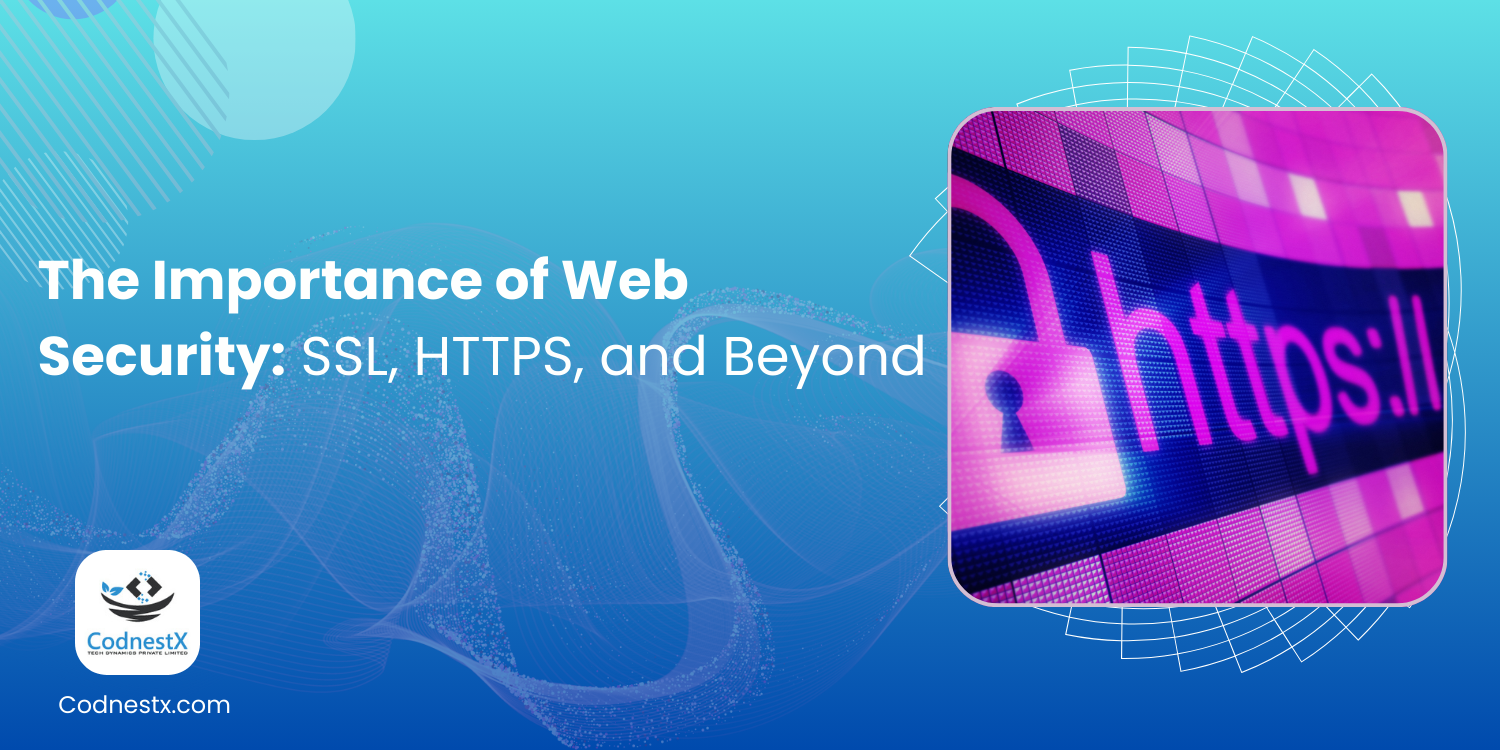The Importance of Web Security: SSL, HTTPS, and Beyond
 CodnestX
CodnestX
Why Web Security Matters
Data breaches and cyberattacks can cost businesses millions of dollars, but beyond the financial loss, they damage brand reputation and erode customer trust. A secure website builds credibility and ensures that users feel safe sharing sensitive information.
Understanding SSL and HTTPS

You’ve probably noticed websites starting with “https://” instead of “http://” — the “S” stands for security, enabled by SSL (Secure Sockets Layer). SSL is a protocol that encrypts data, making it unreadable to anyone except the intended recipient. When a website uses SSL, it also shifts from HTTP to HTTPS, signaling a secure connection.
The Role of SSL in Data Encryption
SSL works by encrypting the data transmitted between a user’s browser and your server. This means that even if a cybercriminal intercepts the data, they won’t be able to read it. This encryption is especially vital when handling sensitive information like credit card details or personal data.
The Evolution from HTTP to HTTPS
HTTP (Hypertext Transfer Protocol) was designed for information transfer but lacked a security layer. HTTPS (Hypertext Transfer Protocol Secure) adds encryption, making it the preferred choice for modern websites. In fact, browsers like Chrome now flag HTTP sites as “Not Secure,” pushing businesses to adopt HTTPS.
How HTTPS Ensures Secure Communication

When a user connects to a website using HTTPS, an SSL certificate authenticates the server and establishes an encrypted link. This process helps prevent man-in-the-middle attacks, where a malicious actor intercepts the communication between the user and the server.
The Importance of SSL Certificates
An SSL certificate is a digital certificate that authenticates the identity of your website and encrypts the data sent to your server. There are several types of SSL certificates:
Domain Validated (DV): Basic level of security, mainly used for small websites.
Organization Validated (OV): Provides a higher level of assurance, often used by businesses.
Extended Validation (EV): Offers the highest level of security and trust, displaying a green address bar.
How to Implement SSL and HTTPS
Switching your website to HTTPS requires an SSL certificate. Here’s a quick step-by-step guide:
Purchase an SSL Certificate from a trusted Certificate Authority (CA).
Install the Certificate on your web server.
Update Internal Links to use HTTPS.
Set Up 301 Redirects from HTTP to HTTPS.
Test Your Website to ensure everything is working correctly.
Beyond SSL and HTTPS: Additional Measures
While SSL and HTTPS are essential, they’re just the beginning of web security. Consider implementing:
Web Application Firewalls (WAFs): Protects your website from malicious traffic.
Content Security Policy (CSP): Helps prevent cross-site scripting (XSS) attacks.
HTTP Strict Transport Security (HSTS): Forces browsers to only interact with your site over HTTPS.
Protecting Against Common Web Threats

Websites face a multitude of threats, including:
SQL Injections: Attackers insert malicious code into a website’s database.
Cross-Site Scripting (XSS): Malicious scripts are injected into web pages viewed by users.
Distributed Denial of Service (DDoS): Overwhelms your server with traffic, causing it to crash.
Implementing security measures like input validation, sanitizing user input, and using anti-DDoS services can help mitigate these risks.
Role of Regular Security Audits
Conducting regular security audits helps identify vulnerabilities before they can be exploited. Utilize tools like Qualys SSL Labs, Nmap, and OWASP ZAP for thorough testing.
The Impact of Web Security on SEO
Google considers web security a ranking factor. Secure websites often rank higher in search results, while insecure websites may be penalized. Additionally, users are more likely to trust and engage with a secure site, reducing bounce rates and boosting conversions.
The Cost of Ignoring Web Security

Neglecting web security can have severe consequences, including:
Financial Loss: Due to lawsuits and compensation.
Reputation Damage: Loss of customer trust and loyalty.
Legal Penalties: Fines for failing to comply with data protection regulations like GDPR.
Best Practices for Maintaining Web Security
Here are some key practices to keep your website secure:
Keep Software Updated: Regularly update your CMS, plugins, and themes.
Use Strong Passwords: Implement multi-factor authentication (MFA).
Monitor Your Website: Use tools like Google Search Console for alerts on security issues.
Conclusion
Investing in web security is crucial for the long-term success of your business. By implementing SSL, HTTPS, and other advanced measures, you not only protect your users but also build a foundation of trust and reliability.
Connect with us for all your IT development needs! Let’s discuss how we can bring your ideas to life — sales@codnestx.com
#WebSecurity #SSL #HTTPS #CyberSecurity #SecureWebsite #SEO #DataProtection
FAQs
1. What is SSL, and why do I need it? SSL encrypts data, making it secure and protecting sensitive information from cyberattacks.
2. Is HTTPS necessary for all websites? Yes, especially if you collect user information or process payments.
3. Can SSL certificates expire? Yes, they typically expire after a year and need to be renewed.
4. How can I check if my website is secure? Look for “https://” in your URL and a padlock icon in the address bar.
5. Does web security affect my site’s SEO? Absolutely. Google favors secure websites, and users are more likely to engage with a secure site.
Subscribe to my newsletter
Read articles from CodnestX directly inside your inbox. Subscribe to the newsletter, and don't miss out.
Written by

CodnestX
CodnestX
CodnestX specializes in digital transformation and software development services, offering advanced engineering solutions to elevate your business. Our expert team simplifies operations, engages audiences, and drives global change by turning your ideas into reality with cutting-edge technology. We excel in helping startups succeed and optimizing enterprise efficiency. With a dedicated team and a focus on innovation, we transform digital presences and achieve business goals. Discover how CodnestX can support your journey towards digital excellence. Explore our portfolio to see our innovative solutions in action.